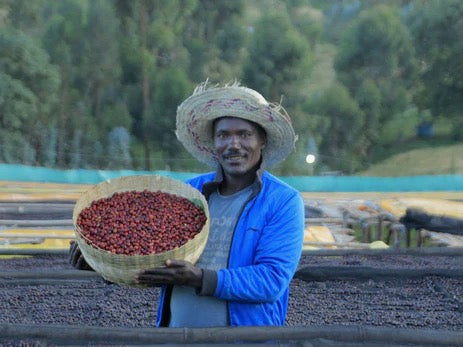
Karamo / Ethiopia
Karamo / Ethiopia
[Flavor profile]
Blueberry, orange, floral, milk chocolate.
Fruity flavors of blueberry and mandarin orange, floral, and a lingering aftertaste of milk chocolate.
【 Info 】
Country of Origin: Ethiopia
Area: Sidama > bura > Karamo
Refinery: Karamo Washing Station
Producers: Approximately 380 small producers
Average farm size: 2ha
Variety: Heirloom
Refining method: Natural
Elevation: 1800 -2200 masl
Harvest season: October to December 2023
Purchasing at production sites in Ethiopia began in 2020, marking the fifth time this year.
This is the first time we have purchased naturally processed coffee from the Sidamo region. The strong fruitiness and moderate body that are unique to this processing method bring out a different character from washed coffee.
Its flavor is characterized by the fruitiness of fresh blueberries and mandarin oranges, a gorgeous aroma reminiscent of purple flowers, and a lingering aroma of milk chocolate. It has a rich fruitiness, but the acidity is rounded and gentle.

Karamo Village is located in the Sidama region, a famous coffee-growing region of Ethiopia. This region is known for producing many award-winning coffees. Karamo Village is located in the Bula Woreda in the Sidama region, at a very high altitude. Due to this high altitude, the harvest season is later than in other regions, and the cherries (coffee fruits) ripen slowly, resulting in complex flavors.
Approximately 350 smallholder farmers deliver cherries to the coffee station, with an average farm size of around 2.5 hectares. Depending on the location of their farm, farmers choose a collection point or station and sell their cherries directly. Upon delivery, an additional sorting takes place and the amount of ripe cherries is recorded for payment.
After sorting, the cherries are transported to drying beds where they are uniformly ripe and stirred by hand at regular intervals to prevent spoilage and over-fermentation. At the peak of the harvest season, cherries arrive almost daily and are moved to different beds depending on their dryness. Cherries that reach a moisture content of around 11% are collected and transported to the drying mill, where they are stored with the parchment remaining until a buyer is found, at which point they are milled and exported as green beans.


I have visited the dry mill of SNAP TRADING, an agent handling exports from Ethiopia, twice in the past two years. Dry mills are usually very dusty and noisy, but their work area is kept very clean, and I got the impression that they are actively investing in equipment to improve quality.
Each department has a manager, and this year, as in the previous year, we were guided by Bahar, who is in charge of the sorting department. To produce high-quality coffee, consistent management is required from cultivation to harvesting and refining. From Bahar's enthusiastic explanation, we could sense the team's determination to produce a high-quality product.




